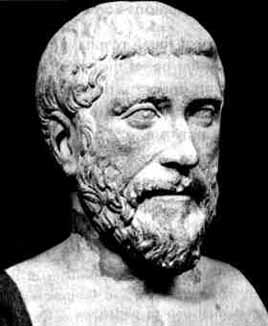

Pythagoras
of Samos was a Greek philosopher responsible for important developments
in
mathematics, astronomy and the theory of music. He left
Samos because of the tyrant who ruled
there and went to southern Italy about 532 BC. He founded
a philosophical and religious school in Croton that had many followers.
His school practiced secrecy and communalism making it hard to distinguish
between the work of Pythagoras and that of his followers. They regarded
their knowledge as something to be kept from all outsiders. They didn't
write things down until the cult began to lose prominence several generations
later, which left a void where the life of Pythagoras should have been.
Consequently, classicists do not know if Pythagoras was actually responsible
for the first proof or not. The legend has it that Pythagoreans was so
excited by its proof that he sacrificed a bull for the occasion, even though
he was against animal sacrifice. His school made outstanding contributions
to mathematics but of his actual work nothing is known.
Although the
theorem now known as Pythagoras' theorem was known to the Babylonians 1000
years earlier, Pythagoras may have been the first to prove it. Evidence
of the theorem can be traced far back into Egyptian history with the help
of the Rhind Papyrus (1788-1580 BC). The Rhind Papyrus itself claims to
be a copy of an earlier work, possibly dating as far back as 2000 BC. The
use of the 3-4-5 triangles (9+16=25) to construct perfect right angles,
indeed seems to have been a very common practice, long ago. Unfortunately,
little information predates the Greeks, so this will probably remain another
mystery of the Egyptians.
Traditionally,
however, the theorem has been credited [in western culture] to Pythagoras
of Samos. The most important discovery of this school was the fact that
the diagonal of a square is not a rational multiple of its side. This result
showed the existence of irrational numbers. Not only did this disturb Greek
mathematics but the Pythagoreans' own belief that whole numbers and their
ratios could account for geometrical properties was challenged by their
own results. Pythagoreans believed that all relations could be reduced
to number relations. This generalization stemmed from observations in music,
mathematics and astronomy. The Pythagoreans noticed that vibrating strings
produce harmonious tones when the ratios of the lengths of the strings
are whole numbers, and that these ratios could be extended to other instruments.
In astronomy
Pythagoras taught that the Earth was a sphere at the center of the Universe.
He also recognized that the orbit of the Moon was inclined to the equator
of the Earth and he was one of the first to realize that Venus as an evening
star was the same planet as Venus as a morning star.
Research Essay Assignment:
1. How did the Babylonians use
the Pythagorean Theorem?
Click here
to get started gathering information on this topic.
2. What are other ways to describe the "rightness" of a triangle?
3. What makes the pythagorean theorem so special?